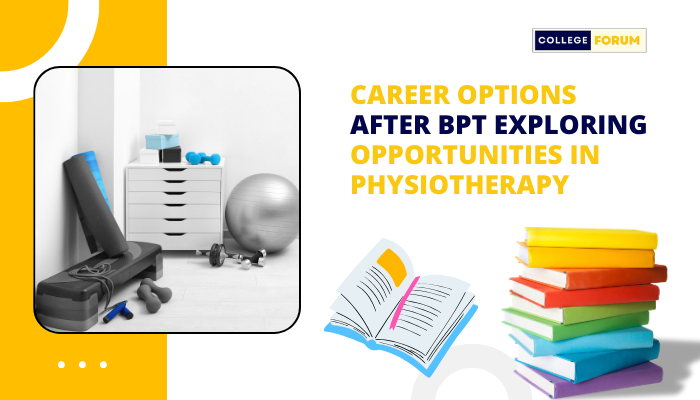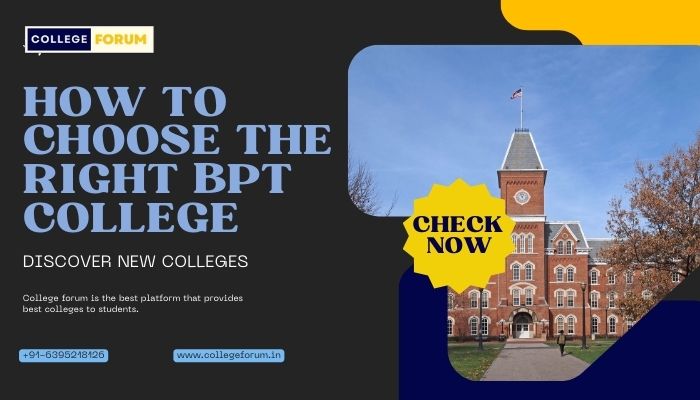Why Choose Bachelor in Physiotherapy? Top 10 Reasons
Are you considering a career in healthcare that involves direct patient care and rehabilitation? If so, pursuing a Bachelor in Physiotherapy (BPT) could be an excellent choice for you. This comprehensive guide explores the top 10 reasons why opting for a Bachelor in Physiotherapy is a smart decision, especially at the best colleges in Dehradun. Diverse Career Opportunities A BPT degree opens doors to a wide range of career opportunities. Physiotherapists are in demand in hospitals, rehabilitation centers, sports clinics, and even corporate wellness programs. With specialized training, you can work with athletes, elderly patients, children with disabilities, or in orthopedic and neurology settings. Hands-On Learning Experience One of the standout features of a BPT program is its emphasis on practical, hands-on learning. From the very beginning, students engage in clinical rotations and internships where they apply theoretical knowledge to real patient scenarios. This experiential learning prepares you thoroughly for professional practice. Contribution to Healthcare As a physiotherapist, you play a crucial role in improving the quality of life for patients. Whether it’s helping someone recover from a sports injury, regain mobility after surgery, or manage chronic pain, your work directly impacts their well-being. It’s a fulfilling career path where you make a tangible difference every day. Job Security and Stability Healthcare careers, including physiotherapy, offer high job security and stability. The demand for physiotherapists continues to grow as populations age and awareness of preventive healthcare increases. This translates into a resilient job market with opportunities across various healthcare settings. Global Recognition and Accreditation A BPT degree from a reputable institution in Dehradun not only prepares you for local practice but also enjoys global recognition. Accredited programs ensure that you receive education aligned with international standards, making it easier to pursue career opportunities abroad or collaborate on international healthcare projects. Continuous Professional Development The field of physiotherapy is dynamic, with ongoing research and advancements. Pursuing a BPT keeps you engaged in continuous professional development. You’ll have opportunities to specialize in areas like sports physiotherapy, pediatric care, cardiopulmonary rehabilitation, or pursue advanced degrees for academic and research roles. Entrepreneurial Opportunities Physiotherapists often have the flexibility to establish their private practices or consulting services. This entrepreneurial aspect allows you to create your schedule, specialize in niche areas, and build lasting relationships with patients and healthcare providers in Dehradun’s vibrant community. Holistic Approach to Healthcare Unlike some medical professions focused solely on treating symptoms, physiotherapy takes a holistic approach to healthcare. It emphasizes patient education, preventive measures, and overall well-being, aligning with the growing trend towards integrative and holistic healthcare solutions. Professional Recognition and Ethics Ethical practice is foundational in physiotherapy. BPT programs emphasize professional ethics, patient confidentiality, and evidence-based practice. This ensures that as a graduate, you uphold the highest standards of care and are respected within the healthcare community in Dehradun and beyond. Personal and Professional Growth Lastly, pursuing a Bachelor in Physiotherapy is not just about career prospects but also personal growth. You’ll develop empathy, resilience, and strong communication skills through patient interactions and interdisciplinary teamwork. These qualities are invaluable, whether you choose clinical practice, research, teaching, or healthcare administration. Conclusion Choosing to study Bachelor in Physiotherapy at one of the best colleges in Dehradun is a decision that offers numerous benefits. From diverse career opportunities and hands-on learning to contributing meaningfully to healthcare and enjoying job security, the reasons to opt for this course are compelling. Whether you aspire to work with athletes, rehabilitate patients, or advance healthcare through research, a BPT degree equips you with the skills and knowledge to succeed. Explore the possibilities that await you in the dynamic field of physiotherapy and embark on a fulfilling career journey that makes a difference in people’s lives. Choose wisely, choose Bachelor in Physiotherapy. Remember, your journey starts here, in Dehradun, at the forefront of excellence in healthcare education.
Why Choose Bachelor in Physiotherapy? Top 10 Reasons Read More »









